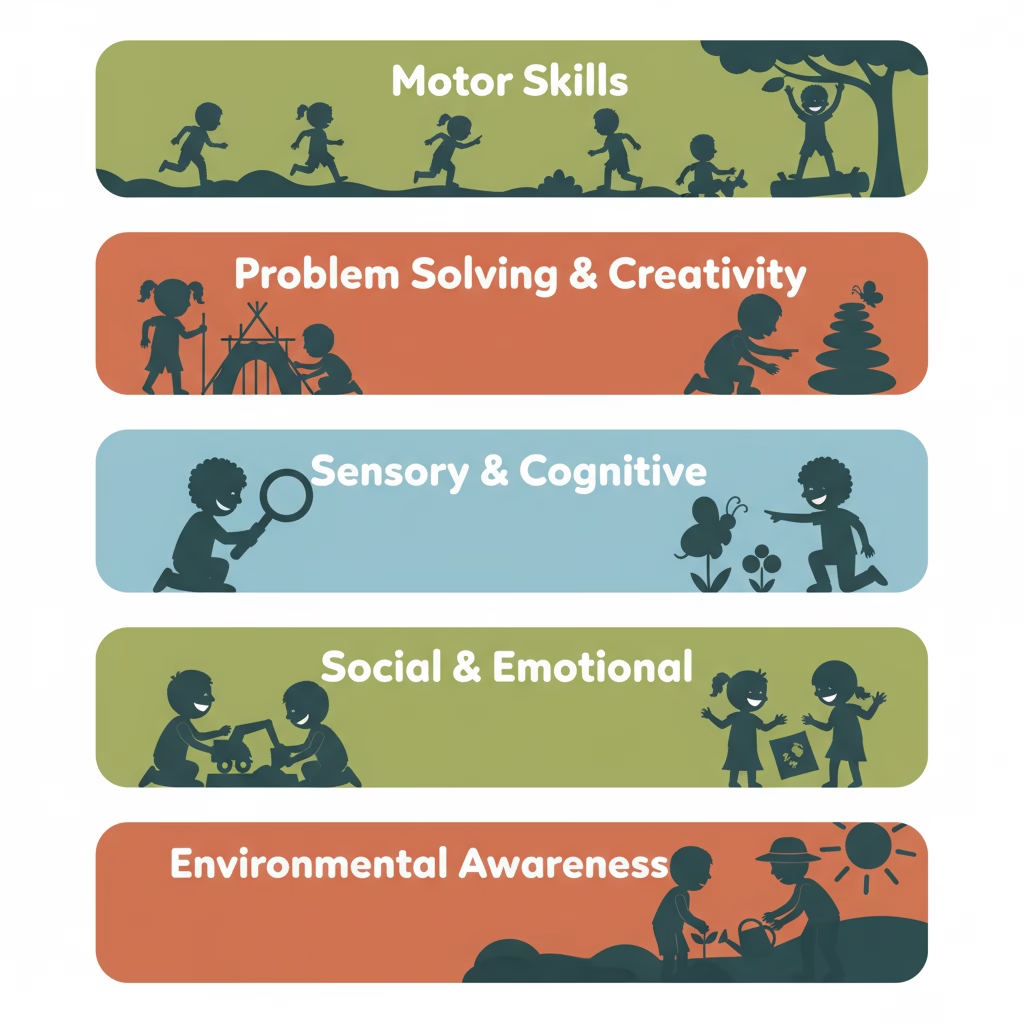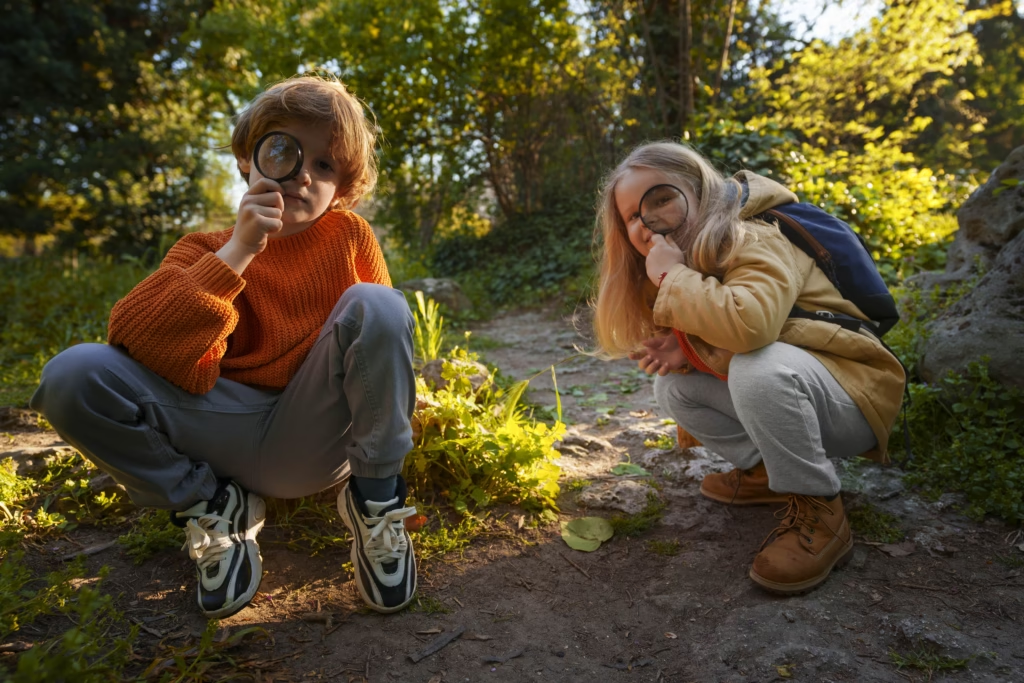In today’s fast-paced, digitally focused world, it’s easy for children to spend more time looking at screens than looking at the clouds. However, early learning experts champion a timeless approach to childhood growth: Nature Play. This isn’t just about getting fresh air; it’s a powerful, fundamental force that shapes a child’s brain, body, and spirit.
If you’ve ever wondered why a simple patch of dirt and a few sticks hold such magic for a child, read on to discover the profound impact of connecting with the great outdoors.
What is Nature Play?
Before diving into the incredible outcomes, let’s define the practice. What is nature play?
In simple terms, nature play is any spontaneous, unstructured activity that takes place in a natural setting. Unlike the fixed rules and predictable structures of traditional playgrounds, nature play is open-ended and child-led. It’s not about following directions; it’s about discovering them.
This can look like a child:
- Building a ‘home’ using branches and leaves.
- Digging for buried treasure in the mud pit.
- Observing insects under a log.
- Using a creek bed to create a flowing dam.
These activities are defined by their freedom, encouraging children to use the natural environment—the sticks, stones, water, earth, and foliage—as their own imaginative, ever-changing playthings.
The Essential Benefits of Nature Play for Child Development
Research consistently shows that nature play is not just fun; it’s a vital developmental tool. The benefits of nature play for child development span cognitive, emotional, social, and physical domains, laying a strong foundation for future learning and well-being.

Cognitive and Creative Enhancement
Natural environments are the ultimate open-ended classrooms. When a child engages in nature play, they are constantly problem-solving and thinking critically.
- Problem-Solving: Deciding which sticks are strong enough to form a bridge or figuring out how to balance stones requires practical application of physics and engineering—all while playing!
- Creative Thinking: Natural materials have no set purpose. A log can be a pirate ship, a table, or a bench. This lack of structure sparks imagination, curiosity, and innovative thinking in ways that pre-determined toys cannot replicate.
- Sensory Input: Engaging with diverse textures, smells, and sounds (rough bark, smooth stones, damp earth, chirping birds) boosts sensory development and observational skills.
Physical Health and Motor Skills
Nature offers a varied and challenging terrain that is unmatched by flat, synthetic surfaces.
- Gross Motor Skills: Running on uneven ground, climbing a small embankment, jumping over puddles, and balancing on logs actively strengthen core muscles and improve coordination, agility, and overall fitness.
- Resilience and Risk Assessment: Nature allows children to practice safe risk-taking. Learning how high to climb or how fast to run downhill teaches them to assess their own capabilities and understand real-world boundaries, which builds physical competence and confidence.
Emotional Well-being and Resilience
Time spent in nature has a proven therapeutic effect on children, helping to combat the stresses of a busy life.
- Stress Reduction: Being surrounded by greenery and natural quiet has been linked to lower levels of stress and anxiety. The soothing rhythms of nature allow children to feel calm and centred.
- Self-Esteem: Successfully navigating a physical challenge—like finally making it to the top of a climbing tree—gives a huge boost to self-confidence and self-efficacy. They learn they can overcome obstacles, which fosters deep emotional resilience.
- Freedom of Expression: Outdoor play provides a less restrictive environment where children can be loud, messy, and fully expressive without the constraints of an indoor space.
Social Collaboration and Empathy
When children play in nature, they often take on large, collaborative projects that demand teamwork.
- Communication & Negotiation: Building a massive fort or digging a shared stream requires dividing tasks, negotiating roles, and resolving minor conflicts over resources (who gets the best digging tool?).
- Empathy and Connection: Exploring nature together enhances empathy as they learn to share discoveries and consider a friend’s perspective. Furthermore, observing the delicate life in an ecosystem—a struggling plant, a tiny insect—cultivates a lifelong sense of care and responsibility toward living things.
Cultivating Environmental Awareness
Perhaps the most crucial long-term benefit is the deep connection it forges between the child and the Earth. Early, hands-on exposure to nature instils a sense of wonder and respect for the environment. Children who play in nature grow up to be adults who understand the importance of conservation, sustainability, and protecting the planet they fell in love with as children.
A Foundational Approach
At Beginnings Early Learners, we are committed to making these invaluable experiences a daily reality for the children in our care at Alfredton and Sunbury. We intentionally design our outdoor environments to be rich in natural elements, providing the sticks, mud, water, and space that unlock a child’s deepest potential.
By encouraging nature play, we are not just occupying their time; we are investing in their future, helping to raise confident, creative, resilient, and environmentally aware individuals ready to thrive in the world. Nature play is a vital part of our play-based learning philosophy.
We invite you to book a tour to see the magic of nature play in action!

